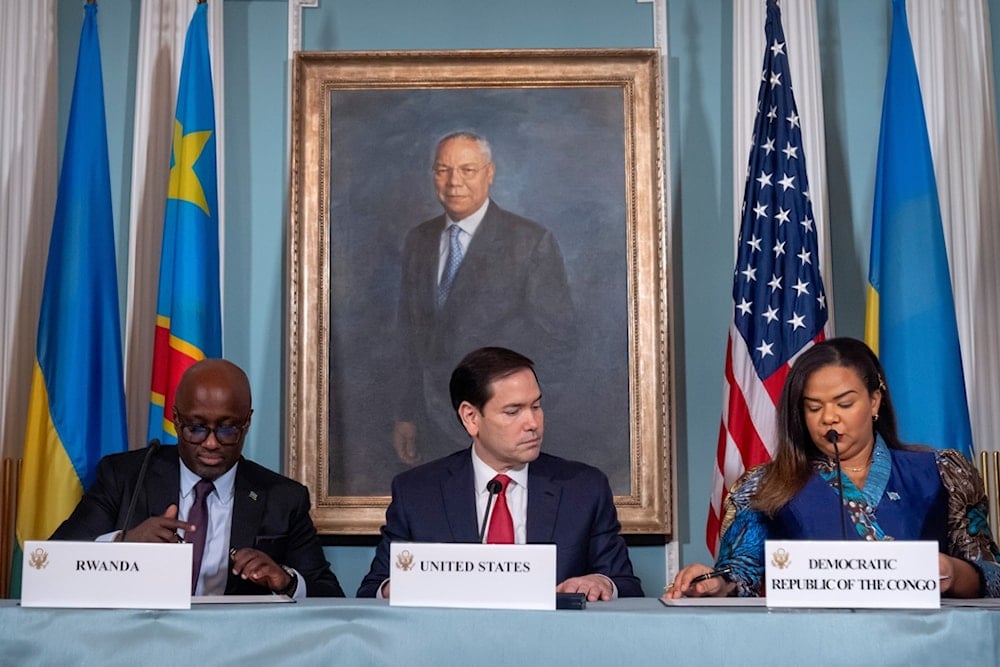Trump boasts 'lot of minerals' access after Rwanda-DRC peace deal
The US-brokered peace has sparked backlash over its mineral-driven motives, lack of justice mechanisms, and risks of foreign exploitation.
-

Secretary of State Marco Rubio, center, watches as Rwanda's Foreign Minister Olivier Nduhungirehe, left, and Democratic Republic of the Congo's Foreign Minister Therese Kayikwamba Wagner, right, sign a peace agreement at the State Department, Friday, June 27, 2025, in Washington. (AP)
The governments of the Democratic Republic of the Congo (DRC) and Rwanda signed a peace agreement Friday in Washington, pledging to reduce support for rival armed factions and end a deadly conflict that has devastated eastern Congo. While the accord has been hailed by some as a diplomatic achievement, criticism is mounting over its implications, particularly US President Donald Trump's candid remarks about securing mineral access as a result.
"Today, the violence and destruction comes to an end, and the entire region begins a new chapter of hope and opportunity," Trump said during a White House ceremony. "This is a wonderful day."
The deal comes in the wake of a rapid advance by the M23 rebel group, widely seen as aligned with Rwanda, which captured key areas in Congo's east, including the strategic city of Goma. The agreement calls on Rwanda to halt what it terms "defensive measures", while the DRC and Rwanda commit to the dismantling of the Democratic Forces for the Liberation of Rwanda (FDLR), a militia made up of remnants of the perpetrators of the 1994 genocide.
Rwanda, DRC speak
"The irreversible and verifiable end to state support to the Hutu militants should be the first order of business," said Rwandan Foreign Minister Olivier Nduhungirehe, while stressing the challenges ahead. "We must acknowledge that there is a great deal of uncertainty in our region, and beyond, because many previous agreements have not been implemented."
His Congolese counterpart, Therese Kayikwamba Wagner, stressed national sovereignty and the chance for lasting peace. "It offers a rare chance to turn the page, not just with words but with real change on the ground. Some wounds will heal, but they will never fully disappear."
Minerals over justice
Though the pact was negotiated through Qatari mediation prior to Trump's presidency, the US leader used the moment to take credit for the deal and pivot to America's economic stake in the region. Speaking to the press earlier in the day, he declared, "The United States will be able to secure a lot of mineral rights from the Congo."
The DRC is home to vast deposits of cobalt, lithium, copper, and other minerals essential for clean energy technologies, resources that have drawn significant international interest, particularly from China. In recent weeks, the Congolese government signaled its intent to finalize a US-backed minerals deal by the end of June, which would include substantial American investment and diplomatic support in exchange for mineral access.
According to reports by Reuters and the Financial Times, the agreement may also formalize mineral exports to Rwanda for processing, despite long-standing Congolese accusations that Kigali has smuggled tens of millions of dollars' worth of minerals across the border and backed the M23 rebellion to fuel that trade.
Codifying exploitation?
While Trump framed the accord as a geopolitical win, critics warn it amounts to codifying exploitation. "The violence and destruction come to an end," he said at the signing ceremony, "and the entire region begins a new chapter of hope and opportunity." But many see it as a chapter scripted around foreign resource extraction.
Unsafe labor conditions, child labor concerns
Human rights groups, including the Fair Cobalt Alliance, have raised alarms about the broader implications of such mineral agreements, especially if protections for Congo's vast informal mining sector are not included. Artisanal and small-scale mining (ASM), which produces a significant share of Congo's cobalt and copper, is often marked by unsafe labor conditions and child labor. Rights advocates caution that an influx of Western investment without structural reforms will likely exacerbate these risks.
Read more: US eyes Congo minerals deal amid child labor concerns
International reactions were mixed. United Nations Secretary-General Antonio Guterres described the deal as "a significant step towards de-escalation, peace and stability" and urged both parties to uphold their commitments.
West hails step; rights groups warn of risks
German and French officials similarly welcomed the accord, with French President Emmanuel Macron calling it a "historic step forward."
But Congolese voices like Dr. Denis Mukwege, a Nobel Peace Prize laureate and longtime campaigner against wartime sexual violence, expressed grave concern. "The deal would amount to granting a reward for aggression, legitimizing the plundering of Congolese natural resources, and forcing the victim to alienate their national heritage by sacrificing justice in order to ensure a precarious and fragile peace," Mukwege said.
Physicians for Human Rights acknowledged the potential for de-escalation but criticized the lack of any clear framework for accountability or justice for victims of war crimes and mass atrocities.
The agreement includes plans for a joint security mechanism and a vague promise of regional economic integration, but as many in the region note, the real test lies in whether it delivers meaningful change—or merely formalizes the status quo while opening the door to deeper entrenchment of foreign mineral interests under the guise of peace.

 5 Min Read
5 Min Read










